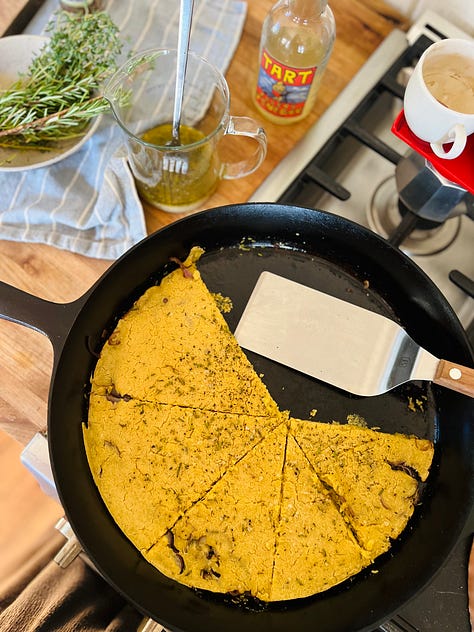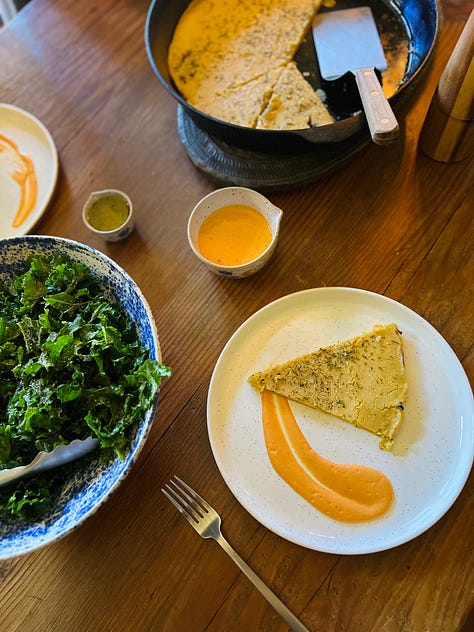Farinata as a Practice in Liberation
“Pleasure and delight in living are not peripheral to the project of liberation!”
This morning, at an impasse of how to feel or what to do or how to go about life and breakfast, as we invoke and plead and pray for a cease fire, I started reading Rebecca May Johnson’s Small Fires An Epic in the Kitchen and was struck by…everything really, but one section especially— her chapter, Cooking is a Method, is part blessing, part instructions, and part permission to take time for beauty and pleasure in the face of oppression. A reminder that cooking and eating well and feeding ourselves and each other is a radical act.
After sitting with this passage for a while, I got up, turned up the music and made a very late breakfast. With my partner watching from the stool, drinking his coffee and holding our 5 month old baby — each of our movements there, in the kitchen, were documents of belief — in divine intervention, in safety, in freedom, in human dignity.
I made the simplest and most stunning thing I know (by heart), lit a few candles and we ate at our table with hope and fear and grief and possibility sitting beside us.
An excerpt from Small Fires, Rebecca May Johnson
No text impresses the radical potential of cooking on me more powerfully or variously than the 'biomythography' of self-described 'black, lesbian, mother, warrior, poet,' Audre Lorde. In Zami: A New Spelling of My Name Lorde depicts her mother's food shopping and cooking as forms of resistance to racial oppression in the 1930s-40s Harlem of her childhood…
In perhaps the most detailed exposition of her mother cooking as a refusal of racism, Lorde describes a picnic. Anticipating their exclusion from segregated dining spaces on a family trip to Washington, Linda makes an exquisite picnic that attends to every conceivable desire:
My mother had roasted two chickens and cut them up into dainty bite-sized pieces. She packed slices of brown bread and butter and green pepper and carrot sticks. There were little violently yellow iced cakes with scalloped edges called 'marigolds', that came from Cushman's Bakery. There was a spice bun and rock-cakes from Newton's, the West Indian bakery across Lenox Avenue from St Mark's School, and iced tea in a wrapped mayonnaise jar. There were sweet pickles for us and dill pickles for my father, and peaches with all the fuzz still on them, individu- ally wrapped to keep them from bruising. And, for neatness, there were piles of napkins and a little tin box with a washcloth dampened with rosewater and glycerine for wiping sticky mouths.
The picnic is a robust refusal to be denied pleasure in the way that the racist state intends. The family are not permitted to eat in the dining car on the train and when they sit down in the ice cream parlour in Washington, the white waitress will not serve them. But Linda ensures that every part of her family's bodies is exalted with the blessings of her picnic. She speaks through every detail - the ‘dainty bite-sized pieces' into which she cuts the chicken; different pickles to suit different palates; the tenderness with which the peaches are handled, so that even the delicate fuzz on their skin remains intact and their soft flesh is unharmed. It is an ode to the body, causing shudders of delight. Through the picnic Linda develops a rich vision for what her family's life should be, 'creating possibility in the space of enclosure, a radical act of subsistence'. (Saidiya Hartman)
The picnic is a political imaginary that can be tasted, an opening to a reality beyond the poverty of existence to which white supremacy would consign black lives. This cook shows that liberation must give dreams earthly form. Her food demonstrates that the purpose of political struggle is to make life materially vibrant and gorgeous for each person. While Lorde's mother does not allow herself to verbally express the hope that Audre might experience fairness at school, she expresses it through the work of feeding her daughters as magnificently as she is able.
In her essay 'Poetry is Not a Luxury' (1985), Lorde emphasizes the material basis of dreaming, of poetry, of revolution, through food:
Our children cannot dream unless they live, they cannot live unless they are nourished, and who else will feed them the real food without which their dreams will be no different from ours?
Lorde tells us that the provision of food which venerates the body and bathes it in pleasure is not a luxury: it is indivisible from political struggle. In 'Beauty is a Method' (2019), Christina Sharpe writes, 'What is beauty made of? Attentiveness whenever possible to a kind of aesthetic that escaped violence whenever possible.' Sharpe elaborates the ways in which her mother attended to the black aesthetic' at home, and through doing so, 'moved me from the windowsill to the world'. Oppression takes place at every scale - in the spreading of butter on bread - and the kitchen is a site from which liberation can be imagined and practised and tasted in fragments.
Below you’ll find my recipe for Farinata, It’s nearly identical to this version from NYT Cooking which I followed closely on my first making and now, through some combination of half-memory and intuition, the perfect farinata comes with ease.
Whatever you make today, I hope it’s a practice in liberation— and that cooking and sharing and eating is a prayer on your tongue:
“If we know, then we must fight for your life as though it were our own—which it is—and render impassable with our bodies the corridor to the gas chamber. For, if they take you in the morning, they will be coming for us that night.
Therefore: peace.”
(James Baldwin, An Open Letter to My Sister, Angela Y. Davis)
Ingredients:
1.5 cups chickpea flour
5 tablespoons olive oil
2 sprigs fresh rosemary, chopped
1 tablespoon fresh thyme, chopped
2 shallots, finely sliced (sub 1 small onion if no shallots are on hand)
flaky salt and fresh ground pepper to taste
How To:
Pre-heat the oven to 450 degrees
In a large mixing bowl mix chickpea flour, teaspoon of salt and a good amount of pepper together then slowly pour 1.5-2 cups barely lukewarm water to mix while whisking to avoid clumping. The result should be a pancake batter consistency, if it’s too watery add a bit more chickpea flour, if it’s too thick, more water
Add a two glugs (roughly 2 tablespoons) of olive oil to the batter, whisk
Cover and let stand for at least 20 minutes or for as long as 12 hours (If you remember to do this ahead of time, which I almost never do, there’s some magic that happens when it sits for more than two hours or so)
Once your oven is hot, put a large cast iron in the oven to heat it, after 5 minutes or so, take it out, cover the bottom with olive oil and add cracked black pepper, half of your chopped rosemary, all of the thyme, and your sliced shallot - the pan should be hot enough where everything is sizzling, if it isn’t, turn the burner on to get the onions browned around the edges
Once the onions have a little color and the herbs are toasty and aromatic, pour in the batter, add more salt and pepper to the top
Place in oven for 10-15 minutes, edges should start to brown a little
At some point, near the end, the top will start to look a little dry and cracked, remove from oven, brush on 1 tablespoon olive oil, finish with salt and the rest of the rosemary, return to the oven for 2 minutes
Cut into pizza slices and serve with a simple salad with vinaigrette on top of farinata slices, or drizzle the slices with vinaigrette and/or make a sauce for dipping







